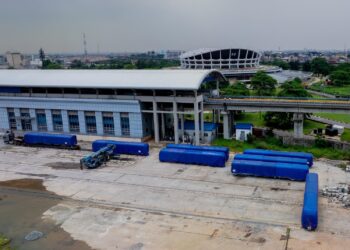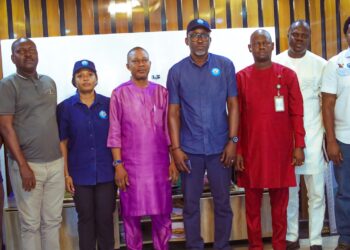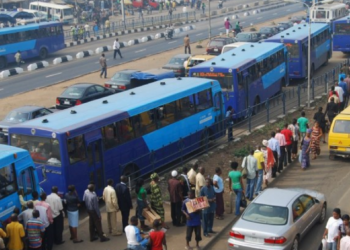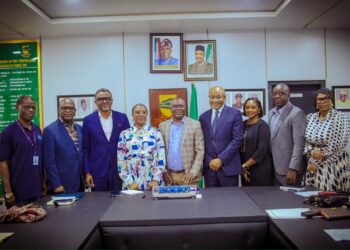The Island part of Lagos has long been plagued by the challenges of traffic congestion, with key routes such as Ozumba Mbadiwe, Ahmadu Bello Way, and the Lekki-Epe Expressway often choked with vehicles.
The rapid growth of the city, paired with limited road capacity, means that daily commutes are a struggle for residents and businesses alike.
The result is long hours spent in traffic, compounded by frequent road repairs and a lack of reliable mass transit alternatives.
In response to this pressing need for a solution, the Lagos State Government has unveiled the alignment for the Green Line, a $3 billion, 70-kilometre metro rail project designed to alleviate pressure on the city’s road network.
The plan, revealed by the Lagos Metropolitan Area Transport Authority (LAMATA), aims to connect key areas from Marina to the Lekki Free Trade Zone, improving urban mobility and offering a much-needed alternative to Lagos’ congested highways.
Understanding the proposed alignment for the Green Line
LAMATA recently revealed the alignment for the 70-kilometre Green Line, featuring 17 stations. The project is set to enhance urban connectivity and ease transport pressure across Lagos, especially along the Lekki-Epe corridor.
- The line begins at Marina Station, running eastward on an elevated track along Ring Road. It crosses the Five Cowries and Falomo bridges before joining the Lekki-Epe Expressway. An elevated Civic Center Station is planned south of Civic Tower.
- Past the Lekki Toll Gate, the alignment transitions to a central at-grade track with stations at Lekki Phase 1, Freedom Way, Jakande Market, and Chevron. After the under-construction Dr. Harris Bridge, the line rises again, running along the expressway’s northern edge through Ajah Flyover, where a three-level elevated Ajah Station will sit.
- It returns to an at-grade alignment beyond Ajah and shifts to the roadside at Abraham Adesanya. From there, it moves through Ogombo, Sangotedo, Green Springs–Lekki Campus, Lakowe, Onosa, Eleko, Ibeju, Okegun, Lekki Airport, and ends at Lekki Free Trade Zone.
- Stations will feature a sleek, modern design with green-and-white color schemes, pedestrian bridges, elevators, and escalators for full accessibility. The supporting infrastructure includes a 23.4-hectare depot near Sangotedo and a 15-hectare parking facility at the Lekki Free Zone.
- Trains will operate in eight-car B-type sets at speeds of up to 100 km/h. With a minimum headway of three minutes, the system is expected to carry 35,000 passengers per hour in each direction. The entire project is estimated to cost $3 billion and will be implemented in phases.
Experts call for better station density to boost Green Line utility
In analyzing the proposed station placements along the Lagos Green Line, experts have raised concerns about sparse coverage in key areas, such as Victoria Island and the Lekki corridor, warning that the current spacing could undermine the line’s usefulness and long-term ridership potential.
- Tonami Playman, an independent transport researcher who studies African transit systems, noted that Victoria Island is still served by only one station at Civic Centre.
“I understand the urge to save cost by routing the alignment along the creek, but this bypasses critical customers, which defeats the cost-saving motive,” he told Nairametrics.
- Playman proposed rerouting the alignment via Ahmadu Bello Way and Ozumba Mbadiwe Avenue, with new stations at Bonny Camp, NNPC, and Union Bank, areas he considers among the most commercially active along the route.
- He stressed that having multiple stations close together near the city center is essential for three key reasons: reducing overcrowding at a single terminal, cutting down on station dwell times that can delay operations, and expanding access points to boost ridership.
- Playman also highlighted wide gaps between stations in Lekki and farther down the corridor. He suggested infill stops at Sandfill and Maruwa in Lekki, as well as additional stations between Chevron and Onosa at key traffic points like Graceland, Abijo, and Beechwood Estate. These were selected, he noted, to fill service gaps while targeting existing high-traffic areas.
Although increasing the station count from 17 to 29 would extend end-to-end travel time from 76 to 92 minutes and add $240–$360 million to the project’s estimated $3 billion cost, Playman maintained that the added accessibility and passenger distribution benefits are worth the trade-off.
“If we assume for simplicity that each station can generate 20,000 riders, a 17-station plan caps ridership at 340,000. Expanding to 29 stations raises that potential to 580,000,” he said.
Echoing similar concerns, Hannah Kates—a Lekki Peninsula I resident, Head of Open Data at Stears, and an urban planner who previously worked at the New York City Department of City Planning—told Nairametrics that the current routing through Victoria Island is quite limiting.
“The station’s location along the creek bypasses some of the busiest commercial and residential zones in the area. Most people will still need to take a bus or car from Civic Centre to get where they need to go, making the train less appealing,” she said.
Kates also flagged that the wide spacing between stations on the Lekki axis could discourage use of the line in an area with intense daily traffic.
“This is an important concern that could limit ridership,” she added.
Other Green Line design and cost concerns
Beyond station spacing, Playman also raised red flags regarding the operational capacity of the Green Line. According to him, designing the line for 8-car B-size trains—160 metres in length—limits its long-term capacity, especially since the Blue Line already uses longer 10-car configurations with 200-metre platforms.
He described the decision as “short-sighted,” likely aimed at reducing upfront construction costs. However, he warned that “going by the population density on that corridor and examples from other cities, 8-car B-size trains are going to be capacity limited.”
He referenced planning missteps in Chinese cities like Beijing and Shanghai, where underestimating initial train capacities led to overcrowding and costly upgrades.
“It’s prudent to plan correctly to avoid spending more money in the future,” he said.
- In his view, 10-car trains are more appropriate for the Green Line, given its linear alignment and the likelihood of heavier crowding as most trips are expected to terminate in Lagos Island or Victoria Island, resulting in lower turnover.
- Playman further detailed that about 82% of the Green Line—nearly 57 kilometres out of 70—would be constructed at-grade, including major segments between Lekki Toll Gate and Dr. Harris Bridge and from Ogombo to the Lekki Free Trade Zone.
- He noted that the project’s cost—estimated at $3 billion. At 69.7km, that’s an average cost of $43 million/km or INT$ 306 million/km. A rather high cost for a line that’s 82% at-grade. Ideally, at-grade rail costs around INT$ 100 million/km, elevated at INT$ 150 million/km, and underground at INT$ 250 million/km. For clarity, INT$ (International Dollars) is a standardized currency used to adjust for differences in purchasing power across regions, providing a more accurate global cost comparison.
Playman suggested to LAMATA that instead of ending the Green Line at Marina, it should be extended as a continuation of the Blue Line, which already has a station there. He explained that terminal stations in city centers often lead to operational gridlocks and that dedicating additional space in Marina for a separate terminal could limit future high-capacity rail development.
Harmonizing the Green Line’s design with the Blue Line, he argued, would allow long-distance riders from Lekki to travel directly onto the Blue Line corridor without switching trains or worsening congestion at Marina.
Additional information on the Green Line project
The Lagos State Government aims to complete the 68-kilometre Green Line of the Lagos Rail Mass Transit (LRMT), stretching from Marina to the Lekki Free Zone, within five years, contingent on the availability of funds.
- Unlike the phased approach used for the Blue and Red Lines, where commercial operations commenced on the completed phases while construction continued on the other, the state plans to finish the entire Green Line before launching commercial operations.
- In early 2025, Lagos signed an MoU with the Federal Ministry of Finance Incorporated (MOFI) to commence preliminary work on the project.
The 2025 Federal Budget proposal includes N146.14 billion as counterpart funding for the Green Line, managed by MOFI. With the federal budget increasing from N49.74 trillion to N54.9 trillion, this funding allocation could see a further rise.
A tripartite agreement was signed in September 2024 among Lagos State, MOFI, and China Harbour Engineering Company (CHEC) to design, finance, and operate the line.
Outlook
Building the entire route of the Green Line in full is the right decision, but its success hinges on the Lagos State Government’s ability to secure the full $3 billion funding before construction begins.
- In Nigeria, projects are often delivered in phases due to financing constraints—a practice that slows down completion and delays the full benefits of such infrastructure. Constructing the Green Line in one go would not only accelerate its delivery but also unlock the full value of the network much sooner.
- Cities around the world expanding their rail systems often build multiple lines at once to maximize ridership through the network effect. Lagos could benefit from this same principle.
- As for disruptions, they are inevitable. The most effective mitigation strategy is speed: commit to building as quickly as possible. Construction schedules should prioritize nighttime activity to minimize daytime gridlock, supported by careful planning and coordination to ease the strain on commuters.






















